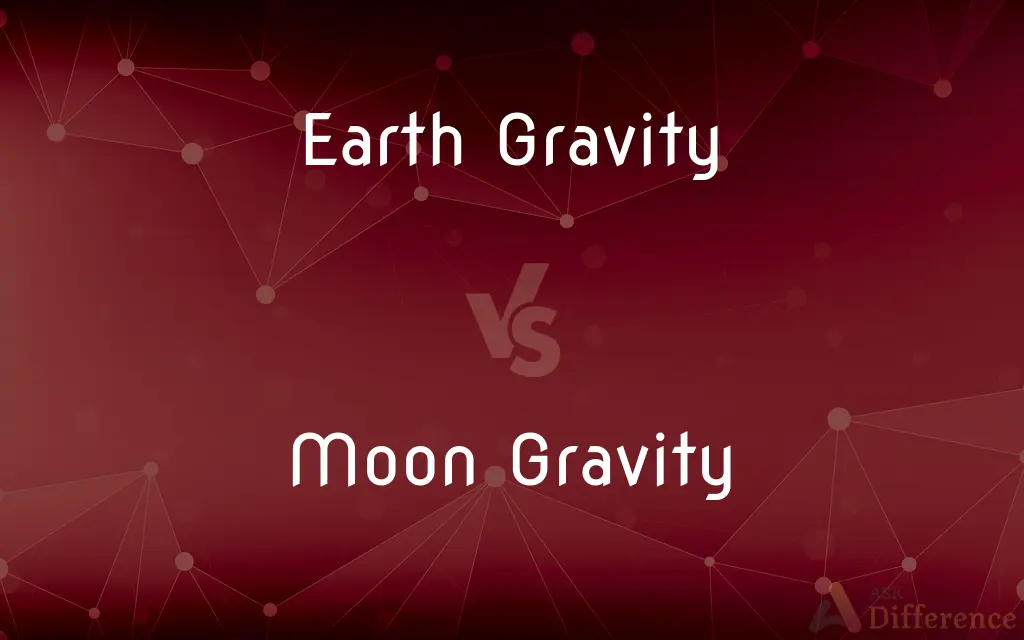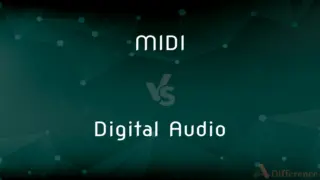Earth Gravity vs. Moon Gravity — What's the Difference?
Edited by Tayyaba Rehman — By Fiza Rafique — Published on November 30, 2023
Earth Gravity is the force exerted by Earth pulling objects towards its center, while Moon Gravity is about 1/6th of Earth's, making objects on the Moon much lighter.

Difference Between Earth Gravity and Moon Gravity
Table of Contents
ADVERTISEMENT
Key Differences
Earth Gravity is the force that our planet exerts on all objects, drawing them towards its center, responsible for keeping everything anchored to the ground. Moon Gravity, conversely, is the force exerted by the Moon, which is significantly weaker, approximately 1/6th of Earth's gravitational pull.
Due to Earth Gravity, we experience weight, atmospheric pressure, and the very structure of our bodies has evolved to counteract it. Moon Gravity, while present, is much weaker, which is why astronauts on lunar missions experienced a much lighter environment, allowing them to make large leaps with minimal effort.
Earth Gravity plays a crucial role in the formation of climates, oceans, and even influences the shape of our planet. Moon Gravity, although weaker, affects Earth in notable ways, primarily causing the ocean tides due to its gravitational interaction with Earth.
The intensity of Earth Gravity ensures that our atmosphere remains intact, sustaining life by trapping essential gases. On the other hand, Moon Gravity, being weaker, hasn't been able to hold a significant atmosphere, leading to the Moon's barren and airless state.
Earth Gravity is consistent with the planet's larger size and mass, making it a dominant gravitational force in our Earth-Moon system. In contrast, Moon Gravity, being less influential, plays a secondary role, yet still has visible effects on Earth.
ADVERTISEMENT
Comparison Chart
Strength
Significantly stronger.
About 1/6th of Earth's gravity.
Effects on Humans
Determines our weight; structures our physiology.
Would make humans feel much lighter.
Role in Atmosphere
Retains a dense atmosphere.
Cannot hold a significant atmosphere.
Effect on Tides
Influenced by the Moon's gravity.
Causes Earth's ocean tides.
Relation to Planet's Size
Consistent with Earth's larger size and mass.
Weaker due to the Moon's smaller size and mass.
Compare with Definitions
Earth Gravity
The pull that keeps our atmosphere and satellites in place.
Satellites orbiting the planet are continually falling towards Earth due to Earth Gravity.
Moon Gravity
Approximately 1/6th the strength of Earth's gravitational force.
Moon Gravity affects the tides on Earth, pulling our oceans.
Earth Gravity
The dominant force shaping our planet's climate and physical features.
Mountains and valleys form over time due to tectonic movements influenced by Earth Gravity.
Moon Gravity
The reason objects on the Moon weigh much less than on Earth.
Equipment on the lunar surface was easier to lift because of Moon Gravity.
Earth Gravity
The force with which the Earth attracts objects towards its center.
Thanks to Earth Gravity, we remain grounded.
Moon Gravity
The weaker pull that affects astronauts during lunar missions.
Walking on the Moon felt different due to the reduced Moon Gravity.
Earth Gravity
The gravitational force exerted by our planet.
Airplanes must overcome Earth Gravity to achieve flight.
Moon Gravity
The gravitational force exerted by the Moon.
Astronauts took giant leaps on the lunar surface thanks to the weaker Moon Gravity.
Earth Gravity
The reason objects fall downwards on Earth.
Earth Gravity ensures that what goes up, must come down.
Moon Gravity
The force shaping the Moon's surface and affecting its orbital relationship with Earth.
The Moon's craters and mountains have evolved under its unique Moon Gravity.
Common Curiosities
How does Earth Gravity compare to Moon Gravity in strength?
Earth Gravity is about six times stronger than Moon Gravity.
How does Earth Gravity affect our daily lives?
Earth Gravity keeps us grounded, determines our weight, and influences the Earth's climate and physical features.
Why doesn't the Moon have a thick atmosphere like Earth?
The weaker Moon Gravity isn't strong enough to hold a dense atmosphere.
Would Earth Gravity ever change significantly?
Not under typical conditions, but massive astronomical events could potentially influence it.
Does Earth's gravity affect the Moon?
Yes, Earth Gravity is responsible for keeping the Moon in its orbit.
Why do astronauts jump higher on the Moon?
Due to the weaker Moon Gravity, which is about 1/6th of Earth's.
Can you escape Earth Gravity?
Yes, with enough velocity known as escape velocity, which is much higher than that required for the Moon due to stronger Earth Gravity.
How does Moon Gravity shape its landscape?
Moon Gravity, though weaker, has influenced its craters, mountains, and valleys.
Why don't objects in space, between Earth and Moon, fall due to gravity?
They do, but they're often in a state of free-fall or orbit due to the gravitational influences of both Earth and the Moon.
Does Moon Gravity have any impact on Earth?
Yes, it's primarily responsible for ocean tides.
If I weigh 180 pounds on Earth, what would I weigh on the Moon?
Due to Moon Gravity being 1/6th of Earth's, you'd weigh about 30 pounds.
How does gravity vary across different planets?
Gravity depends on mass and radius. Bigger, denser planets usually have stronger gravity than smaller, less dense ones.
Why is understanding Moon Gravity crucial for space missions?
Knowing Moon Gravity helps in designing spacecraft, planning trajectories, and ensuring astronauts' safety and efficiency on lunar missions.
Is Earth the only planet influencing Moon Gravity?
Primarily, yes, but all celestial bodies exert gravitational forces, albeit most are negligible compared to Earth's impact.
Can we simulate Earth Gravity on the Moon?
Through centrifugal force in rotating habitats, we might achieve artificial gravity, but naturally, Moon Gravity remains unchanged.
Share Your Discovery

Previous Comparison
Wireless G Routers vs. Wireless N Routers
Next Comparison
MIDI vs. Digital AudioAuthor Spotlight
Written by
Fiza RafiqueFiza Rafique is a skilled content writer at AskDifference.com, where she meticulously refines and enhances written pieces. Drawing from her vast editorial expertise, Fiza ensures clarity, accuracy, and precision in every article. Passionate about language, she continually seeks to elevate the quality of content for readers worldwide.
Edited by
Tayyaba RehmanTayyaba Rehman is a distinguished writer, currently serving as a primary contributor to askdifference.com. As a researcher in semantics and etymology, Tayyaba's passion for the complexity of languages and their distinctions has found a perfect home on the platform. Tayyaba delves into the intricacies of language, distinguishing between commonly confused words and phrases, thereby providing clarity for readers worldwide.












































